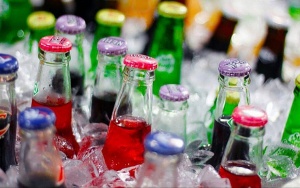Gains outweigh losses with sugar-sweetened beverage tax
How important is the role of excise tax policies in controlling consumption of sugar-sweetened beverages?
We strongly welcome the recently approved move to consider the revised excise tax law in the coming two sessions of the National Assembly.
 |
| Dr. Angela Pratt, World Health Organization representative in Vietnam |
Taxes on sugar-sweetened beverages can be a powerful tool to promote health. This is because raising the price of sugar-sweetened beverages by taxing them encourages people to drink less, and to switch to healthier drinks such as water and other non-sweetened drinks.
Taxes on sugary drinks can therefore help to prevent disease, while advancing health equity and mobilising revenue that can be used to fund the government’s health priorities. They are therefore a win-win-win strategy: a win for public health (and reduced healthcare costs), a win for government revenue and a win for health equity.
We recommend that Vietnam introduces an excise tax on sugar-sweetened beverages at a level that is high enough to reduce demand and consumption. International experience shows that imposing a tax that increases the price of these drinks by 10 per cent will lead to an average reduction of about 11 per cent in total consumption.
Reducing consumption of sugary drinks help to protect health, especially the health of children and young people. This is because regularly consuming sugar-sweetened beverages is associated with an increased risk of type 2 diabetes, cardiovascular disease, dental cavities, osteoporosis, and contributes to people being overweight and obese – all of which are significant health problems in themselves, but can also lead to an increased risk of other non-communicable diseases, including cancer.
These health conditions bring costs for individuals, families, the health system and the economy, such as from lost productivity and early death. Taxing sugary drinks is an important and effective strategy for addressing these challenges.
There is controversy about taxing sugary drinks. What are the losses and gains if Vietnam applies the excise tax on them?
Taxing sugar-sweetened beverages would bring several important gains. Firstly, it would help curb the rapidly increasing consumption of these drinks, which is contributing to the rapidly increasing problem of overweight and obesity in Vietnam.
In Vietnam, consumption of sugar-sweetened beverages has increased rapidly in recent years, from about 35 litres per person per year in 2013 to 52 litres per person in 2020. This is helping to drive an increase in the prevalence of overweight and obesity among youth aged 15-19 years, which doubled from 8.5 per cent in 2010 to 19 per cent in 2020.
In urban areas, the childhood obesity rate has reached as high as almost 27 per cent. Among adults, the rate of overweight and obesity has increased by 30 per cent over the past six years – from approximately 15 per cent in 2015 to over 19 per cent in 2021. There is no reason to think these trends will change without government action.
Secondly, a sugar-sweetened beverage tax will bring in additional government revenue. In Mexico, the government collected an additional $2.6 billion during 2014-2015 from tax on sugar-sweetened beverages. A similar tax in South Africa generated about $200 million in the first two years for the country’s health promotion fund.
As for potential losses, the industry argues that sugar-sweetened beverage tax will affect the poor more. This is not true. In Vietnam, a household living standards survey indicated that higher-income households consume more sugar-sweetened beverages than lower income households. So, poorer families would be less affected by a tax.
In fact, the international experience overwhelmingly shows that taxes on unhealthy products such as tobacco and sugary drinks benefit the poorest households the most. This is because these groups tend to reduce their consumption the most and therefore, stand to benefit in terms of prevention of sugar-sweetened beverage-related non-communicable diseases. In the long run, this will help contribute to saving income and reducing medical costs related to these diseases.
The industry also argues that sugar-sweetened beverage tax will cause job losses. This is not true either. International evidence strongly suggests that consumers shift to water and other non-sugar-sweetened beverages, making up for any job losses or creating new job opportunities. In Mexico and Berkeley of California, more jobs in the food sector were created following the introduction of a tax, while there was no change in employment in Philadelphia in the United States.
What lessons could Vietnam learn from other countries about imposing the excise tax on sugary drinks?
About 110 countries (accounting for 57 per cent of the world’s population) have imposed special consumption taxes on sugar-sweetened drinks, and evidence is building up on the efficacy of tax policies.
In Mexico, a tax of about 10 per cent of the price of sugar-sweetened beverages reduced sales by 6 per cent after six months and 12 per cent by 12 months. Sales of non-sugar drinks such as bottled water increased by 4 per cent.
In the United Kingdom, two years after a tax on sugar-sweetened beverages was introduced, there was a 35.1 per cent decrease in sales of high-sugar drinks (with more than 8g of sugar per 100ml), a 45.5 per cent decrease in sales of drinks containing 5-8g of sugar per 100ml, and a 35.5 per cent increase in sales of drinks containing less than 5g of sugar per 100ml.
People’s health improves as they drink fewer sugar-sweetened beverages. In Mexico, for example, dental cavities reduced significantly after a tax on sugar-sweetened beverages was introduced, and the tax is predicted to help prevent 89,000-136,000 new cases of type 2 diabetes in the next 10 years.
 | MoF proposes a 10 per cent special consumption tax on sugary drinks The Ministry of Finance (MoF) has maintained its view that sugary drinks should be subject to a special consumption tax (SCT) of 10 per cent in a message sent to the government regarding the draft revised SCT Law. |
What the stars mean:
★ Poor ★ ★ Promising ★★★ Good ★★★★ Very good ★★★★★ Exceptional
 Tag:
Tag:
Related Contents
Latest News
More News
- Ho Chi Minh City launches plan for innovation and digital transformation (February 25, 2026 | 09:00)
- Vietnam sets ambitious dairy growth targets (February 24, 2026 | 18:00)
- Masan Consumer names new deputy CEO to drive foods and beverages growth (February 23, 2026 | 20:52)
- Myriad risks ahead, but ones Vietnam can confront (February 20, 2026 | 15:02)
- Vietnam making the leap into AI and semiconductors (February 20, 2026 | 09:37)
- Funding must be activated for semiconductor success (February 20, 2026 | 09:20)
- Resilience as new benchmark for smarter infrastructure (February 19, 2026 | 20:35)
- A golden time to shine within ASEAN (February 19, 2026 | 20:22)
- Vietnam’s pivotal year for advancing sustainability (February 19, 2026 | 08:44)
- Strengthening the core role of industry and trade (February 19, 2026 | 08:35)



















 Mobile Version
Mobile Version